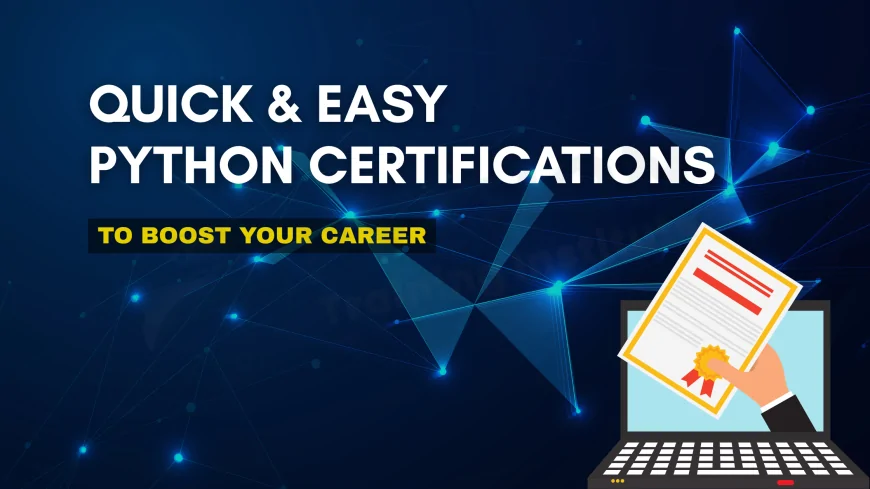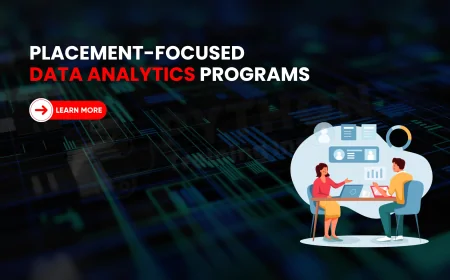Easiest Python Certification to Get in 2025 | Beginner-Friendly & Career-Boosting Options
Looking for the easiest Python certification to start your coding journey? Discover beginner-friendly Python certifications with training from top Python institutes in Pune. Learn key skills, boost your resume, and start your tech career with expert-led courses and placement support.

Python is well-known for its simplicity and beginner-friendly syntax. But beyond the basics lies a rich and powerful ecosystem of tools, libraries, and programming techniques that drive real-world applications across data science, software engineering, automation, cybersecurity, artificial intelligence, and beyond.
If you've mastered loops, conditionals, and basic functions, it’s time to explore what’s next. Advanced Python training doesn’t just improve your coding skills — it transforms the way you design, build, and scale systems. This blog explores what is typically covered in advanced Python training, focusing on unique and high-impact areas that go far beyond standard tutorials.
Let’s break it all down — module by module.
1. Object-Oriented Programming at Scale
While beginners touch on object-oriented programming (OOP), advanced training digs into how to architect entire applications using OOP principles.
Topics typically covered include:
-
Inheritance vs. composition: Understanding when to use subclassing vs. building flexible systems via composition.
-
Encapsulation & abstraction: Designing modular, loosely coupled components.
-
Special methods (Dunder methods):
__str__,__repr__,__eq__,__len__, etc., to make custom classes behave like native types. -
Metaclasses and class decorators: For building frameworks and enforcing constraints at the class-definition level.
Why it matters: OOP is central to maintainable codebases, domain modeling, and software reuse. Advanced Python training helps you design systems that grow without becoming fragile.
2. Iterators, Generators, and Lazy Evaluation
Advanced training goes deep into memory-efficient programming techniques using custom iterators and generators.
Key areas include:
-
Creating custom iterable objects using
__iter__()and__next__() -
Using
yieldand generator functions to handle streaming data -
Generator expressions vs. list comprehensions
-
Using
itertoolsfor chaining, filtering, slicing, and more
Use case: Parsing large files, handling API streams, or building real-time data pipelines without blowing up RAM usage.
3. Closures, Decorators, and Higher-Order Functions
These are core to Python’s flexibility and are used heavily in frameworks and reusable libraries.
Advanced training covers:
-
Understanding closures and lexical scope
-
Writing your own decorators for logging, authorization, caching, and input validation
-
Applying
functoolsutilities likelru_cache,wraps,partial -
Creating function factories using closures and dynamic behavior
Practical application: Building your own plugin systems, intercepting functions for analytics, or injecting behavior into web APIs.
4. Concurrency and Parallelism
Real-world Python applications often need to perform tasks concurrently, especially when dealing with I/O or computational workloads.
Covered topics include:
-
Threading: Understanding the Global Interpreter Lock (GIL), and when it works (e.g., I/O-heavy tasks).
-
Multiprocessing: For CPU-bound tasks across multiple cores.
-
Asyncio: Non-blocking network code and event-driven architecture.
-
Queues, Pipes, Events, Semaphores: Managing shared resources.
Advanced case study: Writing an asynchronous web scraper that runs 100+ concurrent requests without blocking.
5. Functional Programming Techniques
While Python is not a purely functional language, it borrows heavily from functional paradigms — useful for reducing side effects and improving readability.
Advanced Python training covers:
-
Pure functions, immutability, and side-effect control
-
map(),filter(),reduce(), and custom higher-order functions -
Recursion and tail call optimization strategies
-
Using
lambdafunctions and dynamic function composition
When it shines: Data pipelines, mathematical computations, or building predictable testable modules.
6. Data Classes, Named Tuples, and Typed Python
Clean data modeling is critical for modern software. Python has introduced elegant constructs for this.
What you’ll learn:
-
Using
dataclassesfor quick, boilerplate-free classes -
Understanding immutability with
frozen=True -
Differentiating between
namedtuple,SimpleNamespace, anddataclass -
Applying type annotations (
typing) for static analysis -
Type checking with tools like
mypyorpyright
Why it’s important: Improves code readability, tooling support (IDE autocomplete), and prevents bugs before runtime.
7. Exception Handling and Custom Exceptions
Professional software must gracefully handle unexpected input, system failures, and user errors.
Covered in depth:
-
Custom exception class design
-
Context management with
try/except/finally -
The
withstatement and writing your own context managers (__enter__/__exit__) -
Error logging strategies
-
Best practices: fail loudly or fail silently?
Practical example: Wrapping database transactions with context managers to ensure cleanup after failure.
8. File and Data Handling at Scale
Beyond basic file reading/writing, advanced training includes handling large and complex datasets.
Topics include:
-
Working with large CSVs using
csv,pandas, ordask -
Binary file operations with
structandpickle -
Managing compressed files (
gzip,bz2,zipfile) -
File buffering and memory-mapped files
-
JSON, YAML, and XML processing for APIs and configs
Real-world use: Reading a 10GB log file line by line for anomaly detection using a generator and mmap.
9. Testing, Debugging, and Profiling
Professional-grade Python requires rigorous testing and performance analysis.
What’s taught:
-
Writing unit tests with
unittest,pytest, ordoctest -
Mocking I/O and APIs with
unittest.mock -
Code coverage tools and test automation
-
Debugging with
pdb, logging, and breakpoints -
Profiling memory and CPU usage with
cProfile,tracemalloc, andline_profiler
Why it’s essential: Good code without testing is a liability in production.
10. Packaging, Distribution, and Environments
Advanced developers know how to share, isolate, and deploy code cleanly.
Covered areas:
-
Creating packages with
setup.pyorpyproject.toml -
Managing environments using
venv,virtualenv,pipenv, orpoetry -
Versioning strategies and semantic versioning
-
Writing reusable modules and distributing them to others
-
Managing dependencies using
requirements.txtorPipfile
Key value: Write code that others can install, update, and maintain safely.
11. Python Internals and Memory Management
Advanced Python training often lifts the hood on how Python works internally.
Explore:
-
Python’s memory model and garbage collection
-
Understanding references, mutability, and identity
-
sysandgcmodules for diagnostics -
Bytecode compilation and the
dismodule -
Understanding how Python executes statements behind the scenes
Why this matters: Understanding internals helps diagnose performance bottlenecks and weird bugs.
12. Network and API Programming
Many applications need to communicate over networks or work with external APIs.
Advanced concepts include:
-
Socket programming for TCP/UDP communication
-
RESTful API consumption using
requestsandhttpx -
WebSocket communication using
websocketsoraiohttp -
Building custom APIs with low-level libraries
-
Authentication and token handling (OAuth2, JWT)
Practical project: Write a client that connects to a WebSocket-based stock price server and logs real-time updates.
13. Automation and Scripting
Python’s power as a scripting tool is unmatched. Training covers:
-
Automating system tasks (file renaming, backups, etc.)
-
Cross-platform automation with
os,subprocess, andshutil -
Email and notification systems (SMTP, push services)
-
Web scraping and browser automation using
requests,BeautifulSoup, andSelenium -
Scheduled automation with
cron,schedule, orCelery
Why it matters: You can save hours or days of manual work with a few lines of Python.
14. Working with Databases and ORMs
Storing and retrieving data efficiently is critical in real-world apps.
Advanced Python training dives into:
-
Using
sqlite3for embedded databases -
Connecting to relational databases via
psycopg2ormysql-connector -
Query construction and transaction handling
-
Object-Relational Mapping (ORM) with libraries like
SQLAlchemy -
Writing reusable database models and migrations
Use case: Building a Python script that pulls data from APIs and populates a normalized database.
15. Security and Best Practices
Security is often overlooked but crucial in production systems.
Topics may include:
-
Secure password handling with
bcryptorhashlib -
Managing secrets and credentials with
.envfiles and vault systems -
Input sanitization and avoiding code injection
-
Secure file handling and permissions
-
Keeping dependencies updated and scanned
Real-world need: Avoiding security vulnerabilities in scripts that access payment APIs or user data.
FAQ's
1. What is the easiest Python certification to get for beginners?
The easiest Python certification for beginners is the Entry-Level Python Programmer (PCEP). Python Training Institute in Pune offers a hands-on course that simplifies learning for freshers. With structured modules, real-world projects, and expert mentors, this certification helps build a solid foundation and opens doors to internships and junior Python roles.
2. Can I get Python certification without coding experience?
Yes, you can! Python Training Institute in Pune offers beginner-friendly Python courses that require no prior coding knowledge. Their step-by-step approach, live mentoring, and doubt-clearing sessions make certification achievable even for absolute beginners, leading to enhanced employability and freelance opportunities.
3. How long does it take to get an easy Python certification?
At Python Training Institute in Pune, most easy Python certifications like PCEP can be completed in 4 to 6 weeks. Their fast-track batches, weekend classes, and project-based learning help you quickly grasp the core concepts and prepare for certification exams efficiently.
4. Is the PCEP Python certification worth it for freshers?
Absolutely. The PCEP certification from Python Training Institute in Pune helps freshers validate their basic Python skills. It adds credibility to resumes, increases interview call rates, and sets a strong base for advanced programming roles and higher-level certifications like PCAP or CEPP.
5. Which Python certification is best for job seekers in Pune?
For job seekers in Pune, PCEP or PCAP offered by Python Training Institute in Pune are ideal. These certifications are affordable, easy to prepare for, and widely recognized by employers. The institute’s career guidance and placement support further enhance job prospects.
6. How much does the easiest Python certification cost in Pune?
At Python Training Institute in Pune, the easiest certifications like PCEP typically cost between ₹4,000 to ₹10,000, including training and exam fees. The fee covers live sessions, study materials, mock tests, and career counseling, making it a valuable investment for beginners.
7. Are Python certifications helpful in getting internships?
Yes, having a Python certification, especially from a reputed institute in Pune, significantly boosts your chances of landing internships. Employers value certified skills, and Python Training Institute in Pune also provides direct internship opportunities and resume support to students.
8. Do I need to attend full-time classes for Python certification?
No, full-time classes are not mandatory. Python Training Institute in Pune offers flexible learning options including weekend, evening, and online batches. This allows students and working professionals to pursue certification at their convenience without compromising on quality.
9. What topics are covered in the easiest Python certification course?
The beginner-level Python certification course at Python Training Institute in Pune covers variables, loops, functions, conditionals, data types, and basic file handling. Practical projects and quizzes ensure concept clarity and help in confidently clearing the certification exam.
10. Is online Python certification as valuable as offline?
Yes, online certifications from reputed institutes like Python Training Institute in Pune carry the same value. The course includes live lectures, mentorship, and interactive assignments, ensuring no compromise on quality while offering flexibility and accessibility.
11. Can a school or college student take Python certification?
Definitely. Python Training Institute in Pune encourages school and college students to pursue Python certifications. Their beginner-friendly curriculum and supportive environment make it easy for students to start coding early, boosting academic and career opportunities.
12. What kind of jobs can I get after an easy Python certification?
After completing an entry-level certification from Python Training Institute in Pune, you can apply for roles like Python Developer Intern, Data Entry Automation Assistant, QA Analyst, and Junior Developer. The institute also helps with resume building and job referrals.
13. Is Python certification better than learning on YouTube or free platforms?
Yes. While free platforms are useful, certifications from Python Training Institute in Pune offer structured learning, live mentoring, and career assistance. A certification proves your commitment and skills, which self-learning often can’t validate during job interviews.
14. Do companies in Pune accept entry-level Python certifications?
Yes, many tech startups and MNCs in Pune recognize certifications like PCEP and PCAP. Python Training Institute in Pune collaborates with local companies, ensuring their curriculum aligns with industry requirements and increases the chance of successful placement.
15. Can I pursue Python certification after 12th grade?
Yes, Python Training Institute in Pune offers courses for 12th pass students. Learning Python early helps in college projects, competitive exams, and tech career preparation. The easy certification options are perfect for beginners aiming for a tech-savvy future.
16. What are the benefits of easy Python certification for career growth?
Easy Python certifications provide a quick career boost by showcasing verified programming skills. At Python Training Institute in Pune, learners gain hands-on experience and professional mentorship, making them job-ready and more competitive in the job market.
17. Is Python certification required for freelancing?
While not mandatory, a Python certification from a trusted institute in Pune builds credibility with clients. It shows professionalism and a verified skillset, helping freelancers secure better-paying projects in automation, scripting, and web development.
18. What is the exam format for easy Python certifications?
Python Training Institute in Pune prepares students for multiple-choice or code-based online exams. For example, the PCEP exam includes 30 multiple-choice questions, and learners must score 70% to pass. Mock tests and practice sessions are provided.
19. Will I get placement support after Python certification in Pune?
Yes, Python Training Institute in Pune offers 100% placement assistance, including interview preparation, resume building, and direct company referrals. Their strong industry network ensures students are connected with the right job opportunities post-certification.
20. Can I learn Python certification courses part-time while working?
Absolutely. Python Training Institute in Pune provides weekend and evening classes specially designed for working professionals. This flexibility allows learners to upskill without interrupting their current job, paving the way for tech roles and salary hikes.
Why Advanced Python Training Matters
Advanced Python training is not just about learning syntax — it’s about thinking like a software engineer.
It teaches you:
-
How to structure real-world applications
-
How to optimize performance
-
How to manage data securely and efficiently
-
How to debug and test with confidence
-
How to write reusable, shareable, production-grade code
Whether you’re a solo developer or working on enterprise systems, advanced training gives you the tools to work smarter, not harder.
Key Takeaways
If you’ve mastered the basics and want to transition from hobbyist to professional, advanced Python training is the gateway.
It’s where you learn not just how to code — but how to design, test, deploy, and scale applications that solve real-world problems.
And that’s where real engineering begins.
What's Your Reaction?
 Like
0
Like
0
 Dislike
0
Dislike
0
 Love
0
Love
0
 Funny
0
Funny
0
 Angry
0
Angry
0
 Sad
0
Sad
0
 Wow
0
Wow
0















